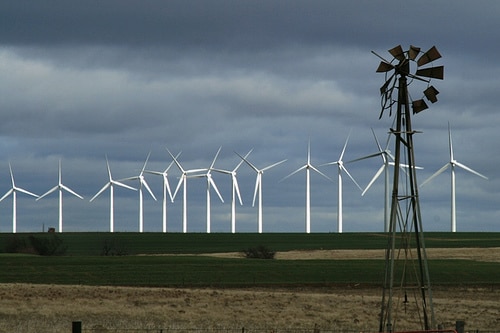A recent Forbes’ article on Vestas Wind’s CEO, Ditlev Engel, and his determination to make wind energy succeed in America, brings to mind the real problem behind renewable energy in the U.S; Congress tends to swing whichever way the wind blows (pun intended).
Vestas came to the U.S. in the wake of the OPEC oil crisis/embargo in 1973. Then, when oil prices dropped in the 1980s, Vestas – like many other renewable energy startups – went bust because the government let renewable energy tax incentives lapse for lack of interest. This effectively dried up venture capital.
Meanwhile, the levels of carbon dioxide (CO2) in the atmosphere continued to rise, from a pre-industrial revolution level of 280 parts per million to a current level of more than 380 ppm. In 1970, we were increasing that level by less than one part per million per year. By 2005, we were kicking it up two 2 per anum.
Of course, CO2 isn’t visible; gasoline prices (and voter dissatisfaction) are. Thus, in 1978, Congress passed the “Gas Guzzler Tax”, which increased fuel efficiency standards for each vehicle model year from 1980 through 1986 – a standard it finally got around to updating in 1990, but never since.
The first significant legislation in the wake of OPEC’s 1973 embargo was the Public Utilities Regulatory Policy Act (PURPA) of 1978, which required utilities to purchase power from qualifying third parties (read renewables) at “avoided cost”. This law lost its teeth because it wasn’t until 2002 that the Federal Energy Regulatory Commission (FERC) adopted the Standard Market Design which allowed renewables to compete – a move much resisted by major utilities but upheld by the U.S. Supreme Court and implemented on September 30, 2004.
Unfortunately, a lack of adequate transmission facilities continues to hamper commercial renewable energy to this day because large wind and solar energy farms are built outside of areas served by current transmission infrastructure. This is partly due to land-use costs and restrictions, but also depends on environmental issues and the inevitable NIMBY factor (the first legitimate, the second deplorable). For homeowners, Ontario, Canada, offers feed-in tariffs that approach actual kilowatt-hour costs paid, but few cities in the U.S. offer similar incentives except Gainesville, Fla.
Senator Harry Reid (D-NV) has introduced legislation to rectify transmission shortages, but the cost to utilities ($3 billion more per year) would put a serious dent in profits and shareholder returns, so don’t hold your breath on this one.
The 1990 Clean Air Act and its amendments – the most significant coming in 2004 – have met so many legal challenges, and so much foot-dragging and evasion on the part of the U.S. Environmental Protection Agency (EPA) that it might as well have been written on the wind.
Renewable legislation is similarly plagued by indecision. Congress’s 1980 renewable energy tax credits (under the Energy Security Act, $2,000 per installation, or 40 percent for solar space and water heating) were allowed to expire at the end of 1987. In 1992, an Energy Policy Act again established renewable tax credits. They died a quiet death in 2001, were revived at a lower rate in March of 2002, expired again in December of 2003 and got resuscitated a year later as part of H.R. 1308. The fourth reincarnation, under the Energy Policy Act of 2005, was capped at $2,000 per system (the usual residential expenditure for solar panels was $20,000), survived until December 31, 2007 and was again extended until the end of 2008.
This kind of Congressional record – of incentives offered and then withdrawn like a political bait-and-switch game – does nothing to support renewable energy, which is essential in weaning America off fossil fuels. In fact, it wasn’t until passage of the American Recovery and Reinvestment Act of 2009, when the PTC dropped its previous cap and now provides a 30-percent tax credit through 2016, that combined federal, state and local incentives put renewable energy on an even footing with fossil fuel energy. Hopefully, Congress can stick with this program until renewables reach grid parity – a situation some experts see occurring as early as this year in some markets, in spite of the effect the economic downturn has had on renewables.
It’s a sad commentary on the country in general, and Congress in particular, that almost all the energy tax legislation since the Reagan era has supported the oil and gas industry rather than renewables. To wit; in the 2005 Energy Policy Act, 66 percent of subsidies were aimed at fossil fuels – a move which Erich Pica at Friends of the Earth calls “the best example of Congress’s largesse toward oil and gas”.
Like Pete Droge’s song of the same name (Going Whichever Way the Wind Blows), Congress seems lost in its own world of oil lobbyists and power politics, throwing away the pages of a renewable energy map as though they were just “useless dots and lines”, though in fact renewable energy is the only way forward in a world increasingly beset by global warming – a world that we can’t really leave behind like an old house once we’ve ruined it.
Subscribe to our newsletter
Stay up to date with DeSmog news and alerts






